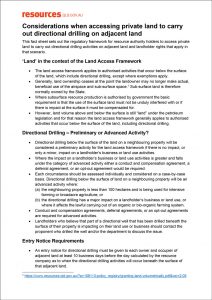GasFields Commission responds to Kupunn landholders’ concerns over deviated gas wells underneath farmland
Farmers from Kupunn in the Western Downs have raised concerns of liability insurance, potential subsidence, and more with the GasFields Commission Queensland after discovering deviated gas wells underneath their properties, potentially causing environmental damage.
Outraged property owners across the Kupunn flood plains west of Dalby hit out at Arrow Energy after they weren’t notified about Daandine Field and Surat Gas Project wells being drilled underneath their land.
The Department of Resources confirmed they had opened an investigation into the matter, and were “working with other government agencies and partners”.
GasFields Commission’s acting CEO Warwick Squire said concerns of public liability insurance protection, potential subsidence, and interference with farming operations arose from this.
“As a result of concerns, the Commission has been proactively engaging with government, agricultural and resource sector peak bodies to raise awareness of these concerns and facilitate appropriate solutions,” Mr Squire said.
 He said a ‘Directional Drilling’ fact sheet recently published by the Department of Resources sets out the requirements for resource authority holders to access private land to carry out directional drilling activities and the landholder rights.
He said a ‘Directional Drilling’ fact sheet recently published by the Department of Resources sets out the requirements for resource authority holders to access private land to carry out directional drilling activities and the landholder rights.
These facts included stipulations that land ownership ceased at the point the owner could “no longer make actual beneficial use” of the airspace, and subsurface airspace.
Other facts then classified directional drilling as as preliminary activity if there was “no impact” or only “minor” impact on the landholder’s business and land use activities.
Kupunn’s Zena Ronnfeldt said in June her farm had already been affected by side effects from the gas wells, which included water pooling on her property.
She also claimed her family was hindered in planting their winter crop due to a large area of land gathering water.
Mr Squire said the Commission expected resource authority holders to engage early and openly with landholders about what the impact drilling may have on their land use and business.
“These expectations have been made very clear to the gas industry,” he said.
“It is vital that all resource companies engage with landholders well in advance of the activities occurring or the delivery of formal notifications.”
An Arrow Energy spokesman said at the time that the relevant deviated wells were drilled in Kupunn, they “genuinely did not believe that the provision of entry notices was required” under the legislation.
Mr Squire suggested landholders contact the resource authority holder initially to discuss any concerns.
Landholders may also wish to make enquiries or lodge complaints about resource exploration or development activities via the Department of Resources’ Resource Community Infoline:
- Phone: 13 71 07
- Email: resources.info@resources.qld.gov.au
- Web (to lodge a complaint): https://www.resources.qld.gov.au/business/mining/resources-complaints-form.
To view media article: https://www.couriermail.com.au/news/dalby/gasfields-commission-queensland-responds-to-kupunn-landholders
What does this mean for landholders?
If you’re a landholder in the Surat, Galilee or Bowen basins and wish to know more about what to expect with gas field developments, the GasFields Commission (the Commission) strongly encourages you to download a copy of our flagship publication, The Gas Guide 2.0, to obtain all the information you need to negotiate a fair and reasonable outcome should a resource company request to operate on your land.
Gas Guide 2.0 catalogues pertinent information that landholders need to know about the various stages of petroleum and gas development in Queensland – beginning with the advertisement and awarding of new exploration tenders (see Chapter 3 – Exploration Phase).
If you have any questions regarding the exploration process, Queensland’s onshore gas industry or you would like to receive a hard copy (ring binder) of The Gas Guide 2.0, please contact us directly via:
- Web: Contact Form
- Phone: (07) 3067 9400
- Email: enquiries@gfcq.org.au
Who are the GasFields Commission Queensland?
Established as an independent statutory body in 2013, the Commission’s purpose is to manage and improve the sustainable coexistence of landholders, regional communities and the onshore gas industry in Queensland. The Commission manages sustainable coexistence in petroleum and gas producing regions of Queensland, and will continue to do so as the industry expands into new and emerging basins.
Our vision is to achieve thriving communities in areas of gas development that are free from discord and supported by well-informed, respectful and balanced stakeholder relationships.
One way the Commission is endeavouring to realise this vision is by providing transparency and independent assurances that the onshore gas industry is appropriately regulated and held to account when needed. This in turn will help cultivate sustainable coexistence, whilst ensuring community and landholder confidence in the regulators and gas industry increases.
Drawing on its wealth of experience in the development of the gas industry and by collaborating with other relevant entities, the Commission provides a range of support to communities and landholders, primarily through education and engagement. These education and engagement activities occur with individual landholders via Commission facilitated webinars, information sessions, publications (The Gas Guide, Shared Landscapes Reports), face-to-face meetings and public workshops.
It should be noted that the Commission does not engage in individual negotiations between landholders and gas companies, but rather provides communities and landholders with the information and support they need to make informed decisions and achieve good outcomes.
Latest Articles
Proposed legislation to expand GasFields Commission’s remit
![]()
What are your views on the onshore gas industry and GasFields Commission Queensland?
![]()
Coexistence challenges and opportunities
![]()
Join the conversation to enhance coexistence in Queensland
![]()
Corrigendum to the report: Review of the Regional Planning Interests Act 2014 Assessment Process
![]()
